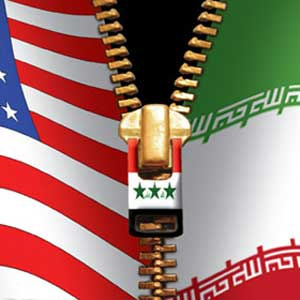Iraq’s Role in the Nuclear Dispute between Iran and West

Military strike on Iran is a hot topic these days, but everybody knows that in case of an attack on Iran’s military sites or nuclear facilities by the United States or Israel, the region will become a fireball, pushed towards total destruction. The closest country to the site of clash will be Iraq, and bullets will put the whole country into fire.
The contingent war will influence Iraq more in its domestic affairs rather than its international status. One issue affected will be the presence of American troops in Iraq, other re-emergence of some Iraqi groups that look after any possible chance to attract United States and Arab countries’ attention to gain power again. This group is ready to enter a war with Iran.
That’s why the Iraqis must try to reduce the chance of war as much as possible and encourage parties engaged with the crisis to sit at the table and negotiate. Definitely due to its situation, Iraq has a major role in removing the possibility of war. To have a peaceful region, all intellectuals and politicians must assume a responsibility in cooling the urge on war. We have tasted war and we know that millions of people have lost their dreams because of war. The Iraqi nation, who has been successful in return security to the country can not tolerate another war; that’ll bring it to its knees.
Iran’s nuclear dispute must be resolved peacefully if we are looking for calm. No wise man denies the aftermath of war, especially on global security and peace. But there are radical groups in the region that try to spark off the conflagration. If necessary, they are ready to spend their oil revenue and shower arms traders with money to reach their goal.
There are also others who are fetish about war. They view their life as dependent on war and believe that others should be sacrificed so that they survive. They do anything they can –and they know their job well- to start the war.
Look at Bandar bin Sultan for example. He is frequenting Russia these days and by signing multi-billion dollar military contracts with Russia, tries to stop their support for Iran and bring Russia to the pro-war camp. We can say the Saudis have replaced Saddam Hussein and try to trigger regional war in anyway possible, just like the executed Iraqi president who troubled millions of Muslims only to maintain his power.
The Saudis are now trying to get Iran into a new crisis to reach two major goals. First, to stop their Shiite population and other minorities from gaining power –since Iran is a source of inspiration for these groups- and second, to pave the way for regime change in Iran by undermining the Islamic Republic. The Saudis want rulers in Iran and Iraq who cause them no worry.
There are other merits for Saudi Arabia as well. If Tehran becomes weak, Saudis will become first power of the region and wielding their accumulating oil dollars, they can expand their domination over Middle East. But meanwhile, Egyptians who are never content with Iran’s policies and have frictions with Tehran are highly worried about a war in the region. Even during his visit with Saud al-Faisal, Ahmad Aboulgheit, the Egyptian FM, has stated that he saw no prospect for war with Iran. Wisely thinking, any war against another Muslim country will engage other Muslim countries.
The great victory for the Muslim world, Middle East and Iraq is to bring parties to the table of negotiations and even if it can’t have a direct role, at least help to control the crisis. For bringing peace to Middle East, Iraq has got to be active, especially when it comes to Iran. It must form a front to stand against war-seeking countries of the region. We shouldn’t forget: the game will continue predictably if the crisis is solved fairly and based on a win-win policy.
Evidently, a peaceful ending will have positive effects for the region, whether economically, politically and socially. Furthermore, we can hope that terrorist organizations abandon Middle East and a new era begins. We can also be hopeful about end of the crisis in Iraq, faster progress in reconstruction and investment. No doubt that compromise between Iran and the United States will be beneficial for both Iraq and the region. That’s when history awaits our constructive role.

